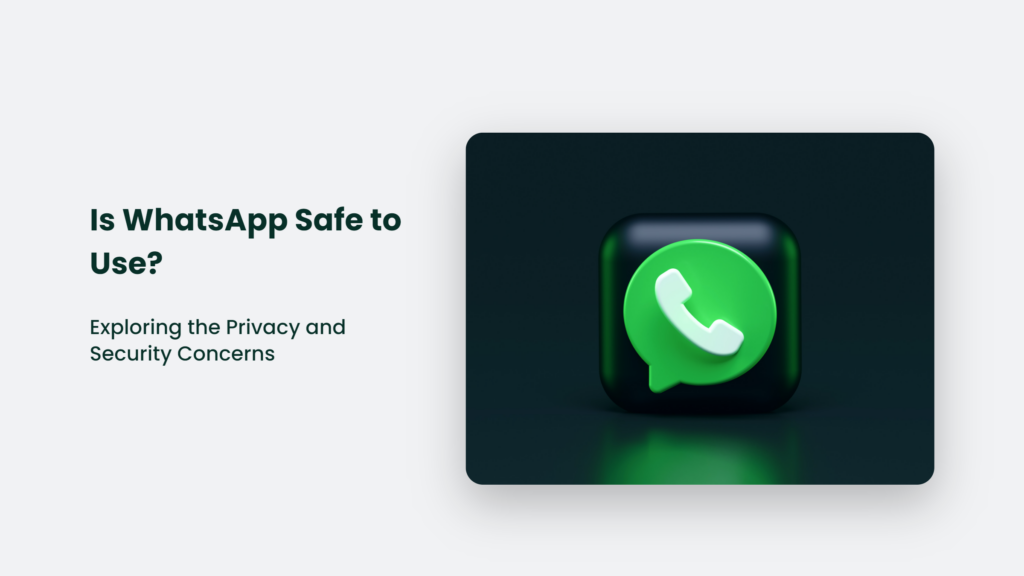WhatsApp has become one of the world’s most popular messaging apps, with over 2 billion monthly active users. Its convenience, flexibility across devices, and ability to easily share messages, photos, videos and more have led to widespread adoption globally.
However, as WhatsApp’s popularity has grown, so have questions like, “Is WhatsApp Safe?”
Can our personal conversations truly remain private? Is our data being exploited or sold? Does WhatsApp have security vulnerabilities that could allow hacking?
With messaging apps holding such personal information, these are critical questions for consumers to consider.

The Encryption Debate
One of WhatsApp’s main security selling points is its end-to-end encryption. It means messages are secured with a lock and key, where only the sender and recipient have the special key needed to unlock and read them. Not even WhatsApp itself can access the content of messages. But is this encryption as secure as WhatsApp claims? Potential weaknesses have been highlighted:
- Backdoor access: While messages are encrypted in transit between devices, some experts warn that backdoors could allow access to the devices themselves before encryption and after decryption.
- Metadata collection: While message content is encrypted, metadata like who is talking to whom, when, where, and more remains visible. This data can still be highly revealing about users’ lives.
So, while the encryption provides some protection, it may not be a waterproof shield.
Data Sharing With Facebook
Critics also point to WhatsApp’s data-sharing policies as a major privacy concern. Though WhatsApp started as an independent company in 2009, Facebook acquired it in 2014 for $19 billion.
Since then, Facebook has been integrating WhatsApp’s operations, data infrastructure and policies. WhatsApp now shares certain metadata and analytics with its parent company, while Facebook uses WhatsApp data to improve ad targeting and product recommendations across its family of apps.
This data sharing alarms privacy advocates. It means personal information flows from your private messages into Facebook’s advertising profile on you for profit and optimization.
Security Issues and Hacking Vulnerabilities
Various security issues have also plagued WhatsApp over the years, leaving users open to hacking and exploitation:
- Malware spreading: Malicious videos, images, or links that trigger malware installs, device takeovers, or spyware can be shared on WhatsApp.
- Fake messages: Scammers have impersonated family or friends on WhatsApp to manipulate victims into sending money or personal information.
- Group chat hacks: Bugs have allowed hackers to infiltrate WhatsApp group chats and read all messages without users even realizing.
While new patches fix past problems, it’s unclear if future vulnerabilities will emerge for hackers to weaponize.
Security Risks Associated with Using WhatsApp:
The security risks associated with using WhatsApp are multifaceted and should be carefully considered by its users. While the app offers end-to-end encryption, which protects messages from being intercepted during transit, there are other concerns that users should be aware of.
Data Sharing and Privacy Concerns
WhatsApp shares user data with other Meta companies, including phone numbers, financial transaction information, and business interactions. This data sharing raises privacy concerns and can potentially be used for targeted advertising.
Security Vulnerabilities
Despite its end-to-end encryption, WhatsApp has been found to have security vulnerabilities. For instance, a vulnerability in the app’s code discovered in 2019 allowed hackers to install spyware on users’ devices remotely, affecting Android and iOS devices. This vulnerability was triggered simply by receiving a WhatsApp call.
Misinformation and Cyberbullying
WhatsApp’s features, such as the ability to forward messages to multiple recipients at once, have made it a platform for the spread of misinformation and fake news. It has been a significant issue in some countries, leading to real-world consequences. Additionally, the app’s allowance for sending messages without a true identity can contribute to cyberbullying and online harassment.
Compliance and Visibility
For businesses, WhatsApp can pose challenges related to information security and compliance. When used unsanctioned by employees, the app’s widespread adoption and lack of visibility into risk exposure can concern enterprise risk teams.
Frequently Asked Questions:
Is WhatsApp owned by Facebook?
Yes, Facebook purchased WhatsApp in 2014 and has increasingly integrated systems and data behind the scenes. This allows Facebook access to certain WhatsApp user data.
Can WhatsApp calls and messages be intercepted?
While WhatsApp uses end-to-end encryption, weaknesses may allow spying under certain conditions. Calls and messages could be intercepted through undisclosed backdoors or infiltrating the sender/recipient devices.
Is WhatsApp safe for work or sensitive conversations?
No, given WhatsApp’s privacy issues and security vulnerabilities, it likely should not be trusted for sensitive workplace communications or conversations requiring confidentiality. More secure apps dedicated to such use cases may be preferable.
Are WhatsApp backups encrypted?
No, end-to-end encryption does not protect WhatsApp backups saved to Google Drive or iCloud. This means backed-up messages are visible to Google, Apple or anyone else who can access those cloud storage accounts.
So, Is WhatsApp Safe For You?
WhatsApp delivers convenience, flexibility and encryption that protect many messages in transit. But privacy loopholes, data sharing with Facebook, and security issues expose users in worrisome ways.
Ultimately, it depends on your personal threat model and level of acceptable risk. For casual chats with trusted friends, WhatsApp may be fine. But for sensitive conversations, it introduces vulnerabilities.
As with all software, there are pros and cons to weigh. However, understanding WhatsApp’s limitations allows you to use it safely and minimize regrets. Pay attention to updates that widen data sharing and opt-out where possible. Enable two-factor authentication, be wary of scams, don’t click suspicious links, and think twice before sharing your deepest secrets through their servers.
With knowledge and care, WhatsApp can be used responsibly. But blind trust in any technology giant’s good intentions may be naive in today’s surveillance economy. Evaluate the options and trade-offs for yourself.




